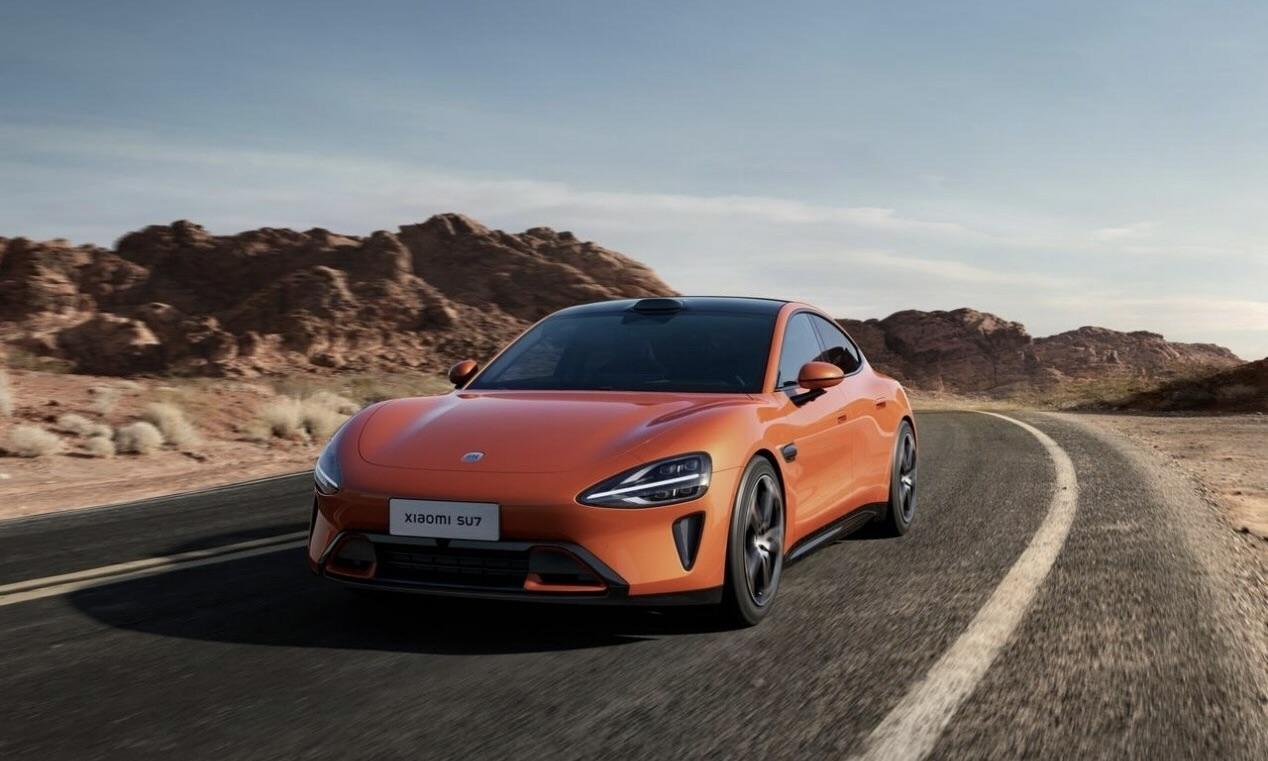Xiaomi CEO Lei Jun revealed that Trump administration sanctions spurred the company's unexpected entry into China's electric vehicle market, aiming to challenge Tesla.
Xiaomi CEO Lei Jun stated on Friday that the business's plan to construct its first electric automobile was prompted by the Trump administration's decision to penalize the Chinese tech company in early 2021. As part of its goal to diversify its product line, Xiaomi, which is mainly known for smartphones and home appliances, joined China's competitive EV market this year.
Friday, during an annual event in Beijing, Lei claimed that Xiaomi started thinking about creating an electric vehicle following what he referred to as "an accident," an announcement made in the last days of the Trump administration that placed the Chinese business on a U.S. sanction list.
Sanctions Lead to Diversification
A friend of mine called me to inform me that we had been fined. According to Lei, "it was like a bolt from the blue." He went on to say that that was the day that Xiaomi called an emergency board meeting, which began the company's mad dash to create an electric vehicle. Lei, who has become famous in China for her extravagant live-streamed product unveilings, expressed regret about her hasty entry into the difficult automobile business, saying, "If it weren't for the huge impact of the unexpected U.S. sanctions."
Reuters shares that more than 1.5 million people watched Friday's event on WeChat, where Lei explained Xiaomi's plan to introduce an electric vehicle that will compete with Tesla and well-known luxury brands like BMW, Audi, and Mercedes.
In May of that year, Xiaomi succeeded in having the penalties that were supposed to limit investment from the United States reversed after challenging them in federal court. The SU7, an electric vehicle with a sporty design reminiscent of Porsche that starts at less than $30,000, was reportedly under development at that point by Lei.
According to Lei, Xiaomi declined a $10 billion offer from venture capitalists to finance its early-stage electric vehicle operations.
Xiaomi’s Ambitious EV Goals
This year, Xiaomi aims to sell 120,000 SU7 EVs and deliver 100,000 of them. This is a considerable jump from earlier this year when the firm estimated it could produce 76,000 vehicles in its first year of operation when it established its sales goal.
Per MSN, as of the end of June, the company had supplied more than 25,000 EVs, according to Lei, and by November, they hoped to have reached their 100,000-unit goal.
He attributed the company's need to diversify to the sanctions, which he said were a result of an accident that occurred three years ago, because of fears that they might hurt the smartphone business.
Only in China can you get your hands on the SU7. The goal, according to Lei, was for Xiaomi to join the ranks of the world's five largest car manufacturers.
Trump’s Impact on EV Industry
In his acceptance speech for the Republican presidential nomination on Thursday, Donald Trump mentioned the electric vehicle (EV) industry and promised to reverse strict vehicle pollution standards, which would hasten the transition to EVs.
While Trump has pledged to encourage Chinese investment in American manufacturing facilities, he has also threatened to impose import duties of up to 200% on Chinese electric vehicles manufactured in Mexico if elected in November.



 Meta Signs Multi-Billion Dollar AI Chip Deal With Google to Power Next-Gen AI Models
Meta Signs Multi-Billion Dollar AI Chip Deal With Google to Power Next-Gen AI Models  APEX Tech Acquisition Inc. Raises $111.97 Million in NYSE IPO Under Ticker TRADU
APEX Tech Acquisition Inc. Raises $111.97 Million in NYSE IPO Under Ticker TRADU  Anthropic Refuses Pentagon Request to Remove AI Safeguards Amid Defense Contract Dispute
Anthropic Refuses Pentagon Request to Remove AI Safeguards Amid Defense Contract Dispute  Middle East Airspace Shutdown Disrupts Global Flights After U.S.-Israel Strikes on Iran
Middle East Airspace Shutdown Disrupts Global Flights After U.S.-Israel Strikes on Iran  Netflix Stock Jumps 14% After Exiting Warner Bros Deal as Paramount Seals $110 Billion Acquisition
Netflix Stock Jumps 14% After Exiting Warner Bros Deal as Paramount Seals $110 Billion Acquisition  Lynas Rare Earths Shares Surge on Strong Half-Year Earnings and Rising Global Demand
Lynas Rare Earths Shares Surge on Strong Half-Year Earnings and Rising Global Demand  Apple to Begin Mac Mini Production in Texas Amid $600 Billion U.S. Investment Plan
Apple to Begin Mac Mini Production in Texas Amid $600 Billion U.S. Investment Plan  Synopsys Q2 Revenue Forecast Misses Expectations Amid China Export Curbs and AI Shift
Synopsys Q2 Revenue Forecast Misses Expectations Amid China Export Curbs and AI Shift  OpenAI Hires Former Meta and Apple AI Leader Ruomin Pang Amid Intensifying AI Talent War
OpenAI Hires Former Meta and Apple AI Leader Ruomin Pang Amid Intensifying AI Talent War  Samsung Stock Hits Record High on Nvidia HBM4 Supply Deal, Boosting AI Chip Rally
Samsung Stock Hits Record High on Nvidia HBM4 Supply Deal, Boosting AI Chip Rally  Pentagon Weighs Supply Chain Risk Designation for Anthropic Over Claude AI Use
Pentagon Weighs Supply Chain Risk Designation for Anthropic Over Claude AI Use  Trump Orders Federal Agencies to Halt Use of Anthropic AI Technology
Trump Orders Federal Agencies to Halt Use of Anthropic AI Technology  Samsung and SK Hynix Shares Hit Record Highs as Nvidia Earnings Boost AI Chip Demand
Samsung and SK Hynix Shares Hit Record Highs as Nvidia Earnings Boost AI Chip Demand  Microsoft Gaming Leadership Shake-Up: Phil Spencer Retires, Asha Sharma Named New Xbox CEO
Microsoft Gaming Leadership Shake-Up: Phil Spencer Retires, Asha Sharma Named New Xbox CEO  Amazon’s $50B OpenAI Investment Tied to AGI Milestone and IPO Plans
Amazon’s $50B OpenAI Investment Tied to AGI Milestone and IPO Plans  Hyundai Motor Plans Multibillion-Dollar Investment in Robotics, AI and Hydrogen in South Korea
Hyundai Motor Plans Multibillion-Dollar Investment in Robotics, AI and Hydrogen in South Korea 































